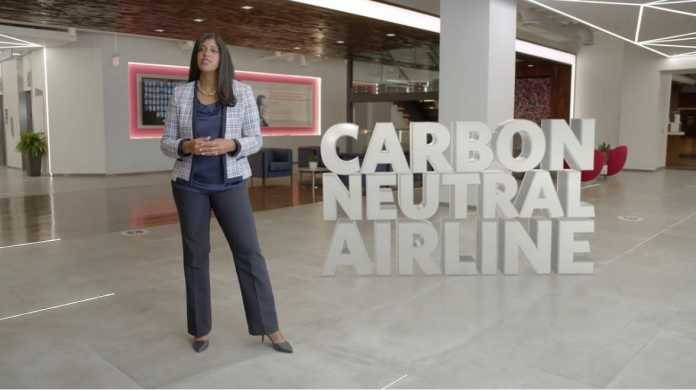Delta Airlines may be running afoul of the U.S. Securities and Exchange Commission (SEC). The SEC is looking for tips on false and misleading climate disclosures. In a press release on March 4th, titled “SEC Announces Enforcement Task Force Focused on Climate and ESG Issues, the SEC says, “…the Climate and ESG Task Force will develop initiatives to proactively identify ESG-related misconduct.”
Coincidentally, also on March 4th, Delta Airlines issued a media release touting its “audacious plan” of going carbon neutral. You can read about it here on their website.
Delta claims:
“In the short term, Delta intends to achieve carbon neutrality by directly reducing emissions through fleet and operational efficiencies and addressing remaining emissions through carbon offset project investments that maintain, protect and expand forests.”
Moving past the nonsensical claim of “zero impact aviation” – which is simply impossible – consider this statement in the release:

Is it truthful to claim that carbon offsets are “a viable, proven and immediate way to make an impact today”?
Are carbon offsets actually ‘viable’?
What does that even mean? Yes, you can buy carbon offsets. Yes, you can greenwash your customers and hide behind the claim of owning offsets on paper. But try describing your financial results to investors merely as ‘viable’ and see what regulators have to say about that. Soft numbers, or inflated numbers don’t really work for the SEC.
Are carbon offsets really ‘proven’?
They surely don’t seem to be. “The idea of carbon offsetting, which underpins so-called net zero targets, is founded on a number of myths,” according to 41 scientists in this article 10 myths about net zero targets and carbon offsetting, busted The scientists also state: “Carbon neutrality targets are often not as ambitious as they sound, relying on problematic carbon offsets and unproven technologies.”
The basic problem is that while emissions happen in real-time, offsets might only happen at some distant point in the future — and the offsets are not really verifiable.
Are carbon offsets ‘immediate’?
How can these offsets be immediate? Carbon dioxide emissions from jet engines happen in real-time. Offsets, assuming they happen at all, happen much later, such as if you buy offsets that claim you’ll plant trees. Even if you purchase offsets ahead of time, that does not mean that the CO2 has already been stored somewhere or soon will be.
The article quoting the 41 scientists also takes on the travel industry in Myth 10: Products and travel can be “climate neutral” or even “climate positive”. False.
The scientists say:
“Products and travel that are sold as “climate neutral” or “climate positive” due to offsetting, do still have a carbon footprint. Such marketing is misleading and may even lead to more emissions as the offsetting incentivises increased consumption. We contribute more to climate solutions by consuming and travelling less.”
Essentially, Delta is just making a marketing ploy to appear they are being “socially responsible” to potential customers. In fact, it is very likely that when all of the numbers are actually analyzed, they will be not be significantly more “carbon neutral” than they are now.
And let’s not forget, there are huge scams in the carbon offset market, such as the 7 billion dollar carbon offset scam discovered in 2010.
And in 2011, Deloitte Australia warned that carbon credit fraud is “the white collar crime of the future.”
It’s easy to print certificates claiming you have carbon offsets, because there’s really no way to check the actual results. Delta’s pie-in-the-sky virtue signaling seems like a perfect investigation for the SEC.

















